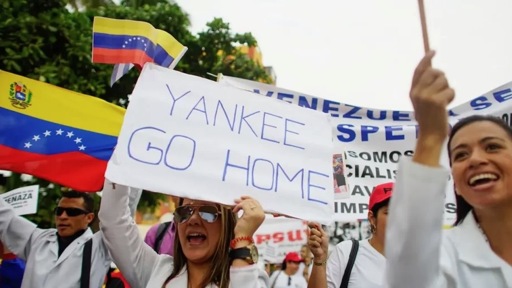European leaders continue to subordinate themselves to the Trump administration, including on the United States’ escalating military threats against Venezuela. Shortly before this month’s CELAC–EU summit in Colombia, several high-ranking figures, including European Commission President Ursula von der Leyen, German Chancellor Friedrich Merz, and French President Emmanuel Macron, suddenly announced they would not attend the meeting. Their move has widely been understood as an attempt to avoid displeasing US President Donald Trump at a moment of mounting US aggression in Latin America.
Read more: A brief overview of US military interventions in the Americas
In contrast, left parties in the region warn against this approach. Instead of supporting US militarism, they insist, Europe should uphold international law, respect the sovereignty of Latin American states, and push for diplomacy over war.
“We are witnessing an unprecedented military escalation in 20 years, a multifaceted aggression that threatens not only Venezuela, but any project of sovereignty and social justice in Latin America,” the Workers’ Party of Belgium (PTB-PVDA) wrote in response to the situation. Italy’s Potere al Popolo echoed this concern, noting that US interests in Latin America have remained unchanged for decades. “On the one hand, it’s about securing access to the immense oil, water, and raw materials reserves, but also to the food production capacities of the Latin American continent (an economic and trade war),” the party wrote. “On the other hand, they want to stifle the efforts of progressive and socialist governments (an ideology war).”
For left organizations from Greece to Britain, there is little doubt that the current US threats against Venezuela amount to a push for regime change. Most see this as yet another step that could trap Latin America and the rest of the world into an even deeper cycle of violence. Despite such concerns, most European governments have not shown any sign of questioning US plans or proposing alternatives. Just the opposite: in addition to skipping multilateral discussions with Latin American counterparts, some have even chosen to reduce diplomatic representation in the region.
Belgium recently announced it would close several diplomatic missions, including those in Havana and Rio de Janeiro. The PTB-PVDA warned against this decision, emphasizing that it is both dangerous and short-sighted. “This is a very bad idea,” said party General Secretary Peter Mertens. “At a time when international law and international relations are already under heavy pressure, and US President Donald Trump is announcing new military aggressions in the Caribbean region, we need more diplomacy.”
Read more: US deploys aircraft carrier and threatens invasion of Venezuela
Peace networks and organizations are similarly calling for a change of approach. Belgian associations Vrede and Intal appealed to parliamentary bodies to take action in light of recent US announcements regarding the launch of its new military initiative, Operation Southern Spear. “Venezuela is risking being plunged into chaos similar to the most devastating conflicts of recent decades, and a prolonged instability could arise across the region,” the groups wrote.
They also warned that Belgium has legal and political obligations to uphold international law and therefore support peaceful solutions. Similar calls have appeared in Britain, where several MPs and peace networks have criticized Prime Minister Keir Starmer for failing to oppose the US militarization drive. “There are deep fears that US military intervention in Venezuela would be the first step in a wider military escalation by Trump in Latin America,” their appeal warns. “The US has a long history of interference in the continent, where so-called ‘regime change’ has caused widespread suffering and lasting harm.”
The Venezuela Solidarity Campaign in Britain also urged action, saying: “The task now is to maximize support for solidarity with Venezuela on the basis of respect for Venezuela’s sovereignty, a recall of the US fleet, and end to US military aggression in Latin America and the Caribbean.”
Read more: From Palestine to Venezuela: The US is behind the door
Those calling for solidarity with Venezuela are well aware that their initiatives stand in stark contrast to the interests of powerful actors poised to benefit from the escalation. “War is beneficial for some, not least those who are well aware that Venezuela sits on the world’s largest oil reserves,” Jeremy Corbyn noted for the Stop the War Coalition.
Despite anticipating a response from conservative and right-wing forces, left parties and progressive networks insist that now is the time to intensify solidarity. “Trump is responding to the crisis of US hegemony with greater militarization of the world. Europe – including Giorgia Meloni’s government – is following suit by increasing military spending and attacking the rights of the working class,” Potere al Popolo stated. “Today, more than ever, we have a duty to stop this expanding war economy, as the dockworkers demonstrated with their recent general strikes and as millions around the world showed by marching for peace.”
The post European left urges solidarity with Venezuela amid growing US aggression appeared first on Peoples Dispatch.
From Peoples Dispatch via this RSS feed


